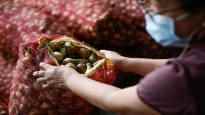MANILA Philippine Airlines flight attendants tried to bring a total of 27 kilograms of onions to the Philippines in their suitcases in mid-January.
However, the ten crew members who flew from Riyadh, Saudi Arabia and Dubai, United Arab Emirates, remained stuck in customs (you switch to another service).
The importation of onions and other agricultural products into the Philippines is prohibited without proper permits to prevent plant diseases and pests.
However, the flight attendants are not the only ones who have stamped the onion into the ground recently. Onions have become such a sought-after commodity in the Southeast Asian island nation.
The pizza chain cut onions from its pizzas
At its most expensive, the onion cost 800 Philippine pesos at the turn of the year, i.e more than 13 euros per kilo (you switch to another service). It has been two to three times more than chicken, pork or beef.
Back in the summer, you could get a kilo of onions for 80 pesos, that is, the same price as in Finland now, just under one and a half euros.
So the price has increased tenfold in half a year.
As a result, restaurants have taken over to dispense (you switch to another service) onion: pizza chains have eliminated it from their pizzas and Burger King (you switch to another service) from their hamburgers.
According to a report made by the online magazine Rappler, yellow onions were in the Philippines at the end of November most expensive in the world (you switch to another service).
Onion humor flourishes on social media, but many families are not laughed at
Onion memes have gone viral on the internet as Filipinos have been joking about the new luxury item, the onion.
However, jokes are few and far between in Filipino families who define (you switch to another service) themselves into poverty.
The onion is an integral part of Filipino cuisine and has become a symbol of inflation in the country.
Right now, the price of onions has dropped from its peak, but a kilo of onions costs still (you switch to another service) more than, for example, a kilo of domestic fish or chicken.
How did it come to this?
The onions rotted on the side of the road, the government snarled imports
The onion soup is a mixture of the inefficiency of farming, the ruthlessness of middlemen and the inaction of the government.
President of Ferdinand Marcos Junior according to the smuggling of onions and other agricultural products out of control (you switch to another service) In the Philippines. Many leading politicians blame the high prices cartels (you switch to another service)who buy onions cheaply from farmers, blacken them and then sell them at high prices to stores.
Smuggling and price manipulation are real problems in the country, but they are by no means the only ones: last spring, for example, farmers had to leave their onions to rot on the roadside (you switch to another service)because there was not enough cold storage.
In the island state, also agricultural products transport (you switch to another service) pokes.
In addition, natural disasters have destroyed the onion crop, most recently the Nalgae storm at the turn of October-November.
The onion shortage was already visible in the summer (you switch to another service)but Marcos has been reluctant to import agricultural products from abroad: he wants support (you switch to another service) and develop the Philippines’ own agriculture. About quarter (you switch to another service) The labor force in the Philippines makes a living from agriculture.
The only problem is that it is in very bad shape.
The president himself is also to be blamed for this. When he started in the summer, Marcos also exceptionally wanted the portfolio of Minister of Agriculture.
He justified the decision by saying that food security is one of his priorities. However, the president has not had time to focus on the problems of agriculture with sufficient seriousness, and has not agreed (you switch to another service) to appoint a full-time agriculture minister despite criticism.
His sister, the senator, has also joined the group of critics Sucks Marcos.
Next up: the garlic crisis
President Marcos allow (you switch to another service) finally limited import of onions from abroad this month, but the decision came unhelpfully late for the citizens who were struggling with onion inflation.
The timing is also unfortunate for farmers: foreign onions start flowing into the country just as the domestic harvest starts. This probably pedals (you switch to another service) farmers’ income.
They already sold their crops earlier this year at a ridiculous price (you switch to another service) and then had to buy onions from the store at a record price.
In the near future, the price of onions is therefore expected to drop at least somewhat.
But the next crisis may be just around the corner: the Philippines is also in short supply from garlic (you will switch to another service), from eggs (you will switch to another service)salt and sugar.
Last fall, the sugar shortage already led to production difficulties for Coca-Cola in the Philippines, among other things.
